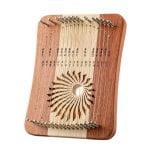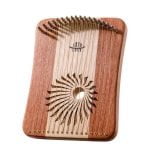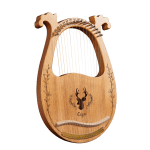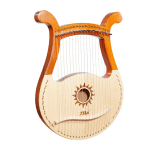
The lyre harp, an instrument steeped in history and mythology, continues to captivate musicians and audiences alike. This article explores the rich heritage of the lyre harp, its unique characteristics, and its enduring appeal in today’s music world.
What Is a Lyre Harp?
A lyre harp is a stringed musical instrument that belongs to the chordophone family. It typically features a U-shaped frame with strings stretched between a crossbar and a soundboard. The number of strings can vary, usually ranging from 7 to 16, though some modern variations may have more.
Key Features:
- U-shaped frame
- Portable and lightweight
- Played by plucking or strumming the strings
- Rich, melodious tone
Historical Significance
The lyre harp boasts a history spanning thousands of years, with roots in ancient civilizations:
- Mesopotamia: Early depictions date back to 2800 BCE
- Ancient Greece: Associated with Apollo, god of music
- Biblical references: Mentioned in the Old Testament
Types of Lyre Harps
- Classical Lyre: Traditional design based on ancient models
- Modern Lyre: Contemporary adaptations with innovative features
- Electric Lyre: Incorporates electronic amplification
Playing Techniques
Mastering the lyre harp involves several techniques:
- Plucking individual strings
- Strumming multiple strings
- Using a plectrum or fingers
- Employing various hand positions for different tones
The Lyre Harp in Modern Music
Despite its ancient origins, the lyre harp has found a place in contemporary music:
- Folk and world music ensembles
- Experimental and avant-garde compositions
- Music therapy and meditation
- Historical reenactments and period performances
Choosing Your Lyre Harp
When selecting a lyre harp, consider:
- Size and portability
- Number of strings
- Material (wood, metal, or synthetic)
- Intended use (performance, practice, or decoration)
Maintaining Your Instrument
Proper care ensures your lyre harp’s longevity:
- Regular tuning
- Cleaning with a soft, dry cloth
- Storing in a protective case
- Avoiding extreme temperatures and humidity
Conclusion
The lyre harp, with its enchanting sound and rich history, offers a unique musical experience. Whether you’re a seasoned musician or a curious beginner, exploring this ancient instrument can open up new realms of musical expression and connect you to a legacy spanning millennia.















